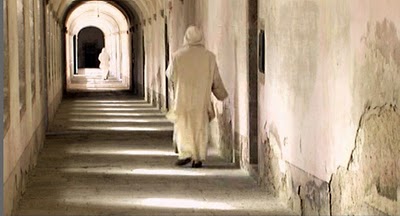So yesterday I wrote about listening to the radio less. This is essentially about reducing the amount of background noise, both sonic and intellectual. But toning down the wallpaper is not the same as knocking a hole through to the other side.
So what have I done to actually make time for silence?
Well I think it’s fair to say that I’m working my way into a daily and weekly rhythm that includes time to be intentionally still. Each morning, my colleague and I spend twenty minutes in silence as part of our morning office. And before Christmas I was more and more reliably including a midday office with ten minutes of silence and night prayer with a further twenty minutes. Over the Christmas break, I let it go. And it’s been more difficult to reinstate since coming back. I’ve been struggling more with another old habit – staying up late.
So it’s a work in progress, but I think there is real progress.
I’m realistic about where I’ve got to, but I’m approaching this with a sense of joy and freedom. I am not experiencing a ‘hardening of the oughteries’! It’s in response to a sense of invitation and call that I am engaged in this journey, not duty.
So what difference does this make?
Perhaps first I’d better reflect on what the experience of reasonably frequently (I can’t quite yet truthfully use the word regularly) spending time in quiet has been like. I know this is a well worn path. Many have been this way before. And my experience has been very similar to the little I’ve read of others entering into a contemplative way of life.
The first word one has to speak is ‘distractions’. We are so trained by our lives to live either in the past or the future that the mind very quickly wants to inhabit that territory. It’s difficult not to go over some incident that has been. Or to start to plan something that is to come. The ironic thing is how often those thoughts are about how I will share with others the beauty of silence and stillness!
You might notice, though, that I haven’t used the words ‘struggle’ or ‘frustration’ in reflecting on that. It seems to me that so much of our lives is cramming stuff into our consciousness (and in me thereby fermenting this sense of near dread that there’s something I’m missing). It’s not unreasonable to expect that given a bit of space, some of the excess of psychic noise will begin to bubble up and out. (I use the word psychic here in its psychological rather than parapsychological sense.) So I actually see this as a positive thing. That doesn’t mean I let the reviewing or planning instinct take over. I try to acknowledge it and draw myself back to simply searching for stillness.
The way that I do that is again very well known. I repeat a simple phrase or word in my mind, in time with my breathing. Mostly I use the Jesus Prayer: ‘Jesus Christ; Son of God; have mercy on me; a sinner’ or occasionally: ‘in God I live and move and have my being’ or as in Advent: ‘mar-a-na-tha!’ (one of those deeply mysterious Aramaic words we generally equate with ‘Come, Lord Jesus!’). That does allow me to re-centre when the mind wanders.
It’s out of that experience, partly, that I have sought to reduce the level of ‘noise’ with which I surround myself (hence listening to the radio less, watching a bit less TV).
The other thing to say (again?) is that stillness is a better word than silence. It would be difficult to achieve with huge amounts of external noise, but on the other hand, true silence is not possible. There’s always the noise of the rain, or the hum of the fridge, or the sound of a car door being slammed, or birdsong. The essential thing is not to tune it out but to gently suppress the sort of categorisation I’ve just done. To be present to the unique sonic qualities of each vibration, without naming what it is. It’s about the unique gift of each sound actually being a doorway to being present to the immediate present moment.
And sometimes, just sometimes, I am brought into a deep sense of inner stillness, calm and presence.
So what difference does it make?
It doesn’t make me one of those annoying, superhuman, people who never lose it, are never phased or upset or worried. But there is a just emerging sense for me that there is a still centre to my being and that in that still centre I connect with Being and that there I am loved; utterly constantly and faithfully loved.











Recent Comments